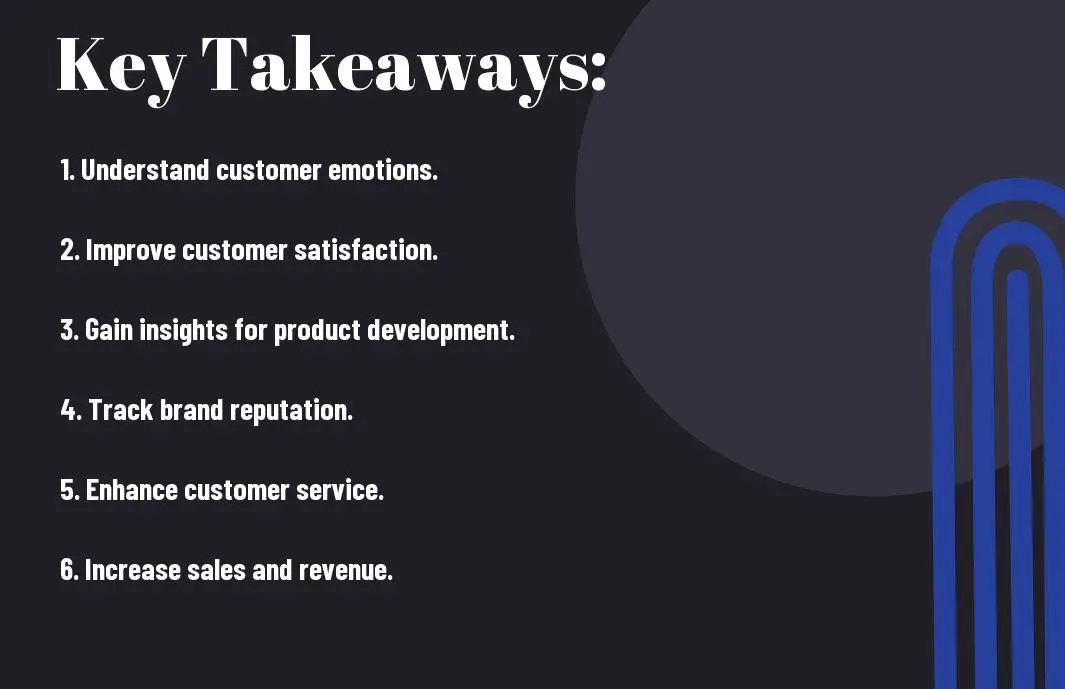Analysis of sentiments can be a game-changer for businesses and individuals alike. Through sentiment analysis, companies can gauge customer feedback accurately, leading to improved products and services, increased customer satisfaction, and ultimately, boosted profits. On the other hand, individuals can benefit from sentiment analysis by making informed decisions based on public opinion, enhancing their overall well-being and happiness. Discover how this powerful tool can create a ripple effect of positivity, leaving both businesses and people smiling with contentment.

The Power of Sentiment Analysis
Unlocking Customer Insights
With sentiment analysis, businesses can examine deep into customer feedback and understand the emotions and opinions behind them. By analyzing customer sentiments, businesses can uncover valuable insights that can help them improve their products and services. Understanding the emotions driving customer feedback allows businesses to address issues promptly and enhance customer satisfaction.
Improving Business Decision-Making
The power of sentiment analysis extends to improving business decision-making processes. By analyzing sentiments expressed by customers or even employees, businesses can gain a clearer understanding of areas that need attention. This data-driven approach enables businesses to make informed decisions that align with the needs and preferences of their target audience.
The insights derived from sentiment analysis can guide businesses in strategizing marketing campaigns or developing new products that resonate with their customers. By tapping into the sentiments of their audience, businesses can optimize their strategies for success.
Boosting Customer Satisfaction
Even the most successful businesses face challenges when it comes to keeping their customers satisfied. One negative experience can lead to a chain reaction of bad reviews and unhappy customers. This is where sentiment analysis plays a crucial role in boosting customer satisfaction.
Identifying Pain Points
On their own, customers might not always express their concerns or dissatisfaction directly to a business. However, through sentiment analysis, companies can identify these pain points by analyzing customer feedback, reviews, and social media interactions. By pinpointing areas of improvement, businesses can proactively address issues and enhance the overall customer experience.
Enhancing Customer Experience
Pain points often revolve around issues such as long wait times, product malfunctions, or poor customer service. By utilizing sentiment analysis, businesses can not only identify these pain points but also take swift action to resolve them. This proactive approach can lead to increased customer loyalty, positive word-of-mouth, and ultimately, improved business performance.
Plus, by continuously monitoring customer feedback through sentiment analysis, businesses can stay ahead of potential issues and trends, ensuring a seamless and pleasant customer experience that keeps customers coming back for more.
Sentiment Analysis in Marketing
Unlike traditional marketing strategies that rely on generalized data and assumptions, sentiment analysis in marketing allows businesses to understand the emotions and opinions of their target audience. This valuable tool helps craft more personalized and effective marketing campaigns that truly resonate with customers.
Crafting Targeted Campaigns
Crafting targeted campaigns is important in today’s competitive market, and sentiment analysis plays a crucial role in this process. By analyzing the sentiment behind customer feedback and interactions, businesses can tailor their messaging and offers to meet the specific needs and preferences of their audience. This level of personalization not only increases the effectiveness of marketing campaigns but also helps build stronger relationships with customers.
Measuring Campaign Effectiveness
Any successful marketing campaign requires a way to measure its effectiveness, and sentiment analysis provides a valuable metric for this purpose. By tracking sentiment before, during, and after a campaign, businesses can gauge the impact of their marketing efforts on customer perception and satisfaction. This data allows businesses to make data-driven decisions to optimize future campaigns for even greater success.
Plus, sentiment analysis can uncover valuable insights that traditional metrics may overlook, such as subtle shifts in customer sentiment or emerging trends in the market. By harnessing this information, businesses can stay ahead of the competition and adapt their marketing strategies to meet the ever-changing needs of their audience.
The Role of Sentiment Analysis in Reputation Management
Monitoring Online Reviews
An crucial aspect of reputation management is monitoring online reviews to gauge customer sentiment. Positive reviews can boost a business’s reputation, attracting new customers, while negative reviews can have the opposite effect. Through sentiment analysis, businesses can track and analyze online feedback to understand customer experiences and make informed decisions to improve their products or services.
Mitigating Crisis Situations
Reputation management becomes crucial during crisis situations, such as a product recall or a public relations scandal. Reputation can make or break a business, and how a company handles such crises can significantly impact its long-term success. Sentiment analysis plays a vital role in mitigating these crises by providing real-time insights into public perception, allowing businesses to respond promptly and effectively to protect their brand reputation.
Mitigating a crisis proactively through sentiment analysis can help businesses regain trust and loyalty from customers, employees, and stakeholders. By addressing concerns transparently and authentically, businesses can turn a potentially damaging situation into an opportunity to showcase their commitment to customer satisfaction and brand integrity.

Sentiment Analysis in Product Development
Many businesses are leveraging sentiment analysis to enhance their product development processes. By analyzing customer feedback and sentiments, companies can make informed decisions that lead to successful product launches and improved customer satisfaction.
Informing Product Roadmaps
Product roadmaps are important for outlining the direction and goals of a product. By utilizing sentiment analysis, businesses can gain valuable insights into customer preferences and pain points. This data can help in prioritizing features, determining which improvements are most crucial, and aligning product development with customer needs and expectations.
Enhancing Product Features
An important aspect of product development is constantly evolving and improving features to meet customer demands. By incorporating sentiment analysis into this process, companies can identify specific features that are highly praised or, conversely, receive a lot of criticism. This information can guide product teams in enhancing existing features or introducing new ones that resonate with customers.
To create products that truly resonate with customers, businesses must listen to their feedback and sentiments. By leveraging sentiment analysis in product development processes, companies can make data-driven decisions that lead to successful launches, improved customer satisfaction, and long-term business growth.
The Future of Sentiment Analysis
All businesses are looking at the future of sentiment analysis with great anticipation. The advancements in AI and machine learning have paved the way for more sophisticated sentiment analysis tools. These tools are now capable of not only identifying positive and negative sentiments but also nuanced emotions like sarcasm, irony, and even cultural contexts.
Advancements in AI and Machine Learning
Analysis of sentiments in text data using Artificial Intelligence (AI) and Machine Learning (ML) is becoming more accurate and efficient, thanks to these advancements. Businesses can now examine deeper into customer feedback, social media trends, and market fluctuations with a higher level of precision. This means companies can make well-informed decisions based on real-time sentiment analysis, which can have a significant impact on their success.
On the other hand, the integration of sentiment analysis with other tools is another exciting development in the field. By combining sentiment analysis with customer relationship management systems, chatbots, and voice assistants, businesses can gain a more comprehensive understanding of their customers’ needs and preferences. This holistic approach can lead to improved customer satisfaction, stronger brand loyalty, and increased profitability.
Integrating Sentiment Analysis with Other Tools
Understanding how sentiment analysis can be integrated with other tools is crucial for businesses striving to stay competitive in today’s market. By incorporating sentiment analysis into their existing systems, companies can streamline their operations, personalize customer interactions, and predict market trends more accurately. This seamless integration can give businesses a significant edge over their rivals and help them stay ahead of the curve.
Summing up
Presently, it is evident that sentiment analysis offers a multitude of benefits for businesses and people alike. By utilizing sentiment analysis tools, businesses can gain valuable insights into customer opinions and feedback, allowing them to make data-driven decisions that can improve customer satisfaction and drive business growth. On the other hand, consumers can benefit from businesses that use sentiment analysis to improve their products and services, resulting in a more personalized and satisfying experience.
FAQ
Q: What is sentiment analysis?
A: Sentiment analysis is a process used to determine the emotions, attitudes, and opinions expressed in text data. It involves analyzing the language used to understand whether it conveys positive, negative, or neutral sentiment.
Q: How can businesses benefit from sentiment analysis?
A: Businesses can benefit from sentiment analysis in various ways. By analyzing customer feedback, reviews, and social media comments, businesses can gain valuable insights into customer satisfaction, identify areas for improvement, and make data-driven decisions to enhance their products and services.
How does sentiment analysis contribute to happy people?
Sentiment analysis contributes to happy people by allowing businesses to respond promptly to customer feedback and concerns, leading to improved customer satisfaction. When businesses listen to their customers and take action based on their feedback, it fosters a sense of trust and loyalty, ultimately resulting in happier customers and a positive business-customer relationship.
FDSmax Local App has a Sentrend and Geo-Sentrend analysis to help the business make intelligent decisions based on Sentiment and Trend analysis and serve the local people and communities effectively.




